#godzilla meta
Explore tagged Tumblr posts
Text
I Have Become Death, the Destroyer of Worlds
(Spoilers for Oppenheimer)
The original 1954 Godzilla can best be described as an anti-nuclear war film...that just happens to have a giant monster in it.
When you get right down to it, Godzilla himself was originally a big metaphor for the atom or hydrogen bomb. A big, unstoppable harbinger of death that once unleashed, it's only a matter of time before destruction follows. And you have to remember, it was made by victims of the Hiroshima and Nagasaki bombings not even a decade after. So any allusions to those attacks are pretty deliberate on their choice. You cannot simply separate Godzilla from the fires that birthed him.
Just like how you can't simply separate J. Robert Oppenheimer from the atrocities his weapons wrecked.
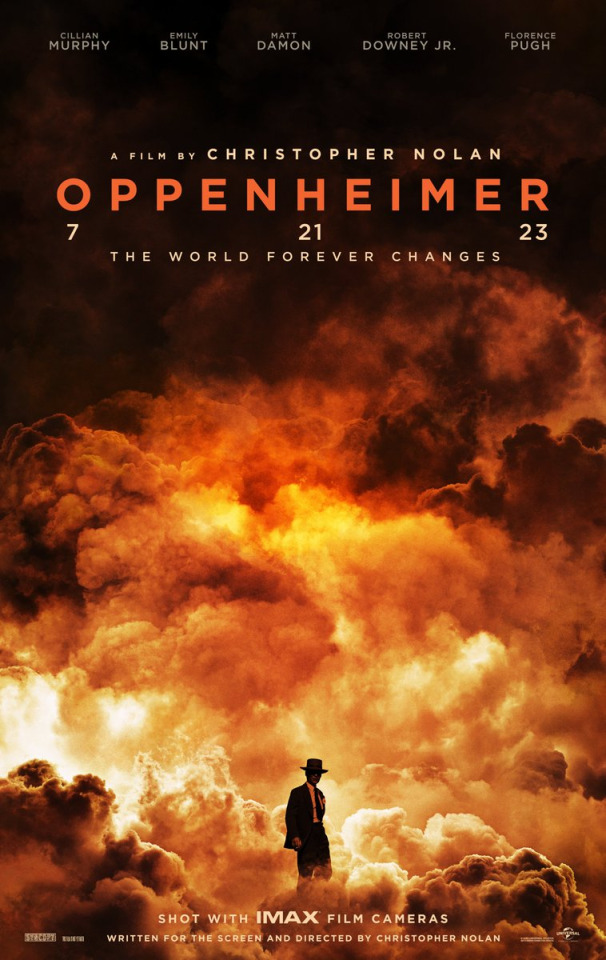
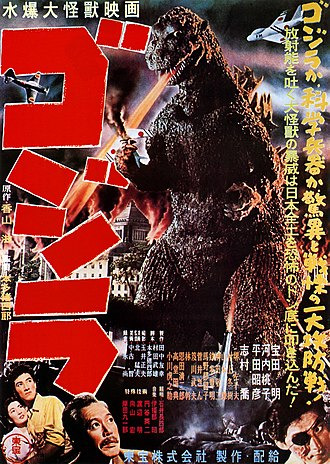
It's become kind of a trend with movie goers to frame Oppenheimer as a pseudo prequel to the Godzilla series. Particularly with the announcement by Toho of Godzilla Minus Zero later this year which deals with the immediate aftermath of the bombings which sounds like a natural continuation of the events of Oppenheimer. Course there's the obvious difference between a biopic and a sci-fi monster movie.
But remember how I mentioned that the original Godzilla was an anti-nuclear war film that happened to have a giant monster? Cause in many ways, that logic does apply here. And as a result, both films do carry a lot of the same themes and tone despite being released over 50 years apart.
For one, there's a sense of dread with both films in regards to the bombings. With Oppenheimer, it's a feeling of unease as the USA pushes for the continuation of the Manhattan Project despite the surrendering of the Nazis. It was always there, but it increases the closer we get to the bombing, such as when Oppenheimer and his staff grow increasingly nervous to the testing, the patriotic fervor that takes over when it goes well, and the shot of the Fat Man and Little Boy being carted of with Oppenheimer and Teller contemplating whether the bombing will truly bring world peace.
Same thing with Godzilla. We have an overpowering sense of dread as the existence of a huge, unstoppable monster begins to dawn on everyone. How nothing seems to work against it and the creeping horror of it coming closer and closer to Japan without any viable solution being found. With Oppenheimer, we know the end story even if the characters don't, and the anticipation comes from the knowledge of the carnage that their actions will bring being at contrast with what's seen on screen. In Godzilla, the dread comes from being the recipient of that horror, and the characters scrambling to find any sort of solution in the face of unrelenting fury.
It comes to a head with the final scenes of the film, with Oppenheimer and Einstein grimly wondering if the invention of the atom bomb might've just spelled the doom for the entire planet, while Dr. Yamane monologuing about how chances are there's another Godzilla out waiting to be awakened by more nuclear testing. It's that sort of apocalyptic dread which binds the two films together, with the different perspectives allowing two different approaches to the same anti-nuclear warfare conclusion. Both from the people who made the bomb, and the people who were bombed.
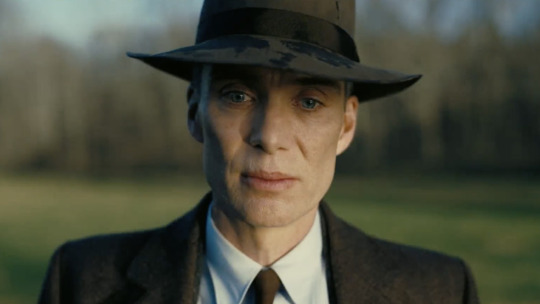
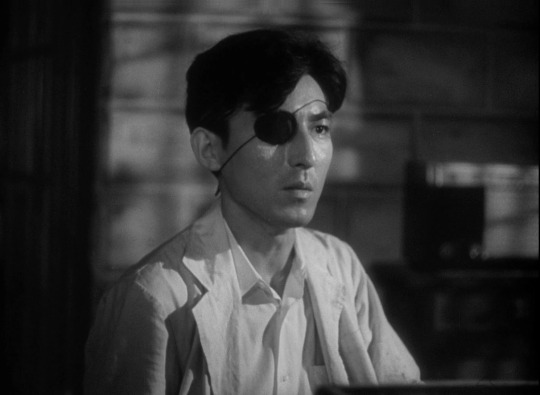
And the similarities don't end there. We do get a parallel with Oppenheimer and the fictional character of Dr. Serizawa, which perfectly demonstrates the sort of differential approaches both films take. Both view their respective forces (the atom bomb or the Oxygen Destroyer) as having the potential to do so much good, not necessarily for warfare but more as an energy source for the betterment of mankind.
The difference is how both are exposed to World War II. Oppenheimer is distant, never being on the frontlines and only hearing about Hitler's death via the news. As a result (and part of an overarching character flaw), he never really considers the ramifications of building an atomic bomb. He's uneasy with it, but he'll try to justify himself by saying it saved the US a costly invasion and the bombing scaring the rest of the world off from even attempting to replicate his invention (it didn't, much to his horror). Serizawa was a soldier for the Japanese army before becoming a scientist. He's absolutely horrified by his creation, knowing for a damn fact that people will use it for a weapon, that it could possibly cause a devastating arms race, and is determined to keep it under wraps until he can find a nondestructive use for it. He only uses it to destroy Godzilla when the threat of the latter is undeniable, but even then takes his own life lest he risk his knowledge being used to create another one.
Both characters came to the same conclusion: Oppenheimer realizing he may have just doomed the world far too late and Serizawa being wracked with fear of what would happen if the Oxygen Destroyer was deployed too liberally. Again, it's the difference between the two that highlights how each film handles the same message. One only realizes what he's created until it's far too late, the other is filled with dread by the inevitability of that creation being used for lethal purposes.
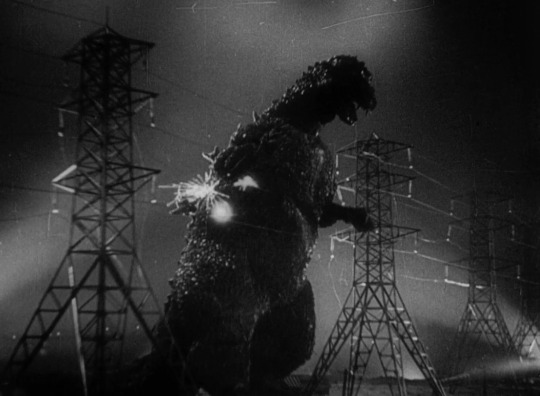
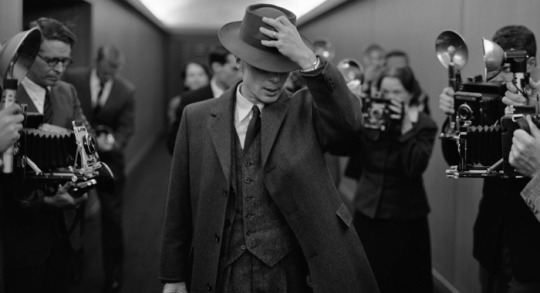
So in many ways...yeah. Oppenheimer can be seen as a prequel to Godzilla, and both can be viewed as companion pieces towards one another. Of course, one ultimately still is a giant monster film, the other a historical biopic. But when the tones are so similar and themes so consistent, it's quite telling that you can easily see the two as being two sides of the same coin.
After all, the original Godzilla was an anti-nuclear war film that features a giant monster. Oppenheimer is that same premise but without the monster and from the opposite perspective. Yet both share the same apocalyptic message.
#godzilla#gojira#godzilla 1954#godzilla meta#oppenheimer#oppenheimer 2023#oppenheimer movie#oppenheimer spoilers#giant monsters#kaiju#movie comparison
81 notes
·
View notes
Text











I really hate that I don't have $1,329.99 to spend on this Godzilla statue just to have it collect dust somewhere in my house whenever I walk by it.
82 notes
·
View notes
Text
since we're all Godzilla minus oneing
I want to talk about the way Godzilla looked. Because this wasn't Jurassic Park. This wasn't about designing a creature that looks and moves like an animal we're familiar with. There's a type of recognition horror when the way a fictional creature on screen moves in a way the back of your brain recognizes as real. Those dinosaurs in JP, when they run, leaning low for balance with their tails, muscles under the skin moving, jaws snapping, eye pupils dilating - the monkey part of your brain screams 'oh fuck, run!'
That's not Godzilla.
Godzilla isn't built like an animal our brains will recognize. He's not a running chicken in lizard form or a darting lizard that's too big and too fast. He doesn't blink. He doesn't smooth muscle move. There's no animal in his steps, not use of his arms. He's not designed for our monkey brains to recognize.
He's designed for our human brains.
Because it doesn't matter that he doesn't register as animal in our subconscious. He's something even more terrifying. 'Animal' we can at least recognize. He's not 'animal'. He's 'other'. He's as other as a hurricane or an earthquake.
As a nuclear explosion.
'Animal' we recognize has needs. Hunger. Fear. Anger. It's mortal and its - satiable. It will reach the end of its need and then it will move on.
Godzilla isn't satiable. He's not doing what he's doing out of hunger or fear or anger. He won't get his fill of it and then go away. He's a force. A tsunami. And that makes him terrifying in a way that the monkey part of our brain can never be terrified.
Yes, they designed him to be true to the guy in the rubber costume from the originals but they used that. The story tells us he's an animal - but our visual brains don't recognize it.
He's a monster.
He's a terror.
He's Godzilla.
#godzilla#godzilla minus one#my nephew and I were talking#about how his design was so unlike the american movies that tried to lean into the animal part#and how he shouldn't be as terrifying as he was because he doesn't look 'animal'#and then we realized THAT was the point#anyway#meta#metaing along
147 notes
·
View notes
Text
saw godzilla minus one the other day. spoiler under the cut
i thought it was really interesting how the film bait-and-switched the audience about the seat eject.
Because that's what it comes down to: Koichi is a failed kamikaze, and is filled with guilt about it and his survival on Odo island after Godzillas attack.
So as stories go it has to come full circle; the moment the plane is introduced we know exactly what Koichi is planning. He's going to kamikaze- to fulfill his destiny, to save his friends, to save tokyo and japan as a whole.
He finds Tachibana because he knows two things: Tachibana is the only other survivor of Odo Island (because Koichi failed to save them) and he knows that Koichi is a failed kamikaze. Tachibana is the only person that will help Koichi enact his plan
And yet. Tachibana, as angry and guilt ridden and full of survivor's guilt as he is about Odo island-- he doesn't let Koichi kamikaze. And the film shows this at first as something that Tachibana is keeping from Koichi; they talk about kamikaze, about fate and death, and Tachibana points out a seemingly last-minute addition to the plane: a safeguard, to make sure the bomb blows as it should.
But this is framed like a lie. The audience watching sees this and goes-- Tachibana is lying. He's forgiven Koichi, or something similar, and he's telling Koichi that the eject mechanism will set off the bomb because he knows Koichi will try to kill himself.
Later in the movie, we see Koichi making his decision. He flies to the mouth of Godzilla, the last-minute, last-chance attempt at stopping it. We see the lever pulled (the lever that won't do what Koichi was told).
Koichi is, in fact, ejected right before the plan crashed into the mouth of Godzilla.
But this film does something that not a lot of films do. It shows us a continuation of the scene where Koichi and Tachibana talk about the plane, and we see that Tachibana has told Koichi about the eject mechanism (and he wasn't lying about the bomb mechanism, either!) There was never a lie. It wasn't a quest for death cut short. It wasn't a decision made for Koichi.
Koichi made the decision to live all on his own, and it was a chance given by the one person who knows how he feels most of all.
I just. Really like how they did it
146 notes
·
View notes
Text

I was bored so I made favorite character bingo. It was so hard to limit myself to a few characters so I may make another in the future. Overall it was very fun!
#favorite character bingo#harley quinn#the thing 1982#meta knight#bunger#laios touden#shadow the hedgehog#two face#harvey dent#princess peach#leon s kennedy#falin touden#chimera falin#alice angel#futaba sakura#jason todd#jolyne cujoh#godzilla#bruce wayne#batman the animated series#noriaki kakyoin#sally the ragdoll#nemisis#spamton#king ghidorah#mettaton ex#knuckles the echidna#maria silent hill
26 notes
·
View notes
Text
Thinking about how Serizawa's sacrifice with the nuclear bomb in KOTM is not only poetically ironic given his namesake's fate in the 1954 film, but also reflects how the public perception of Godzilla as a character and cultural icon and the conversation around nuclear technology has changed over those decades
Godzilla has gone from the looming specter of human brutality and powerlessness in the face of its own creations in the 1954 original, to a still potent force of destruction that nonetheless upholds a natural world that humans can exist with in the Monsterverse. Nuclear power came into this world as a cruel bomb, and the bombs still exist, but it's also clean energy (at least in terms of emissions)—an especially relevant comparison given the way KOTM invokes pollution and climate change both in Emma's motivations and the cascading effects of Ghidorah's awakening
Daisuke Serizawa wanted his discoveries to die with him, knew he'd discovered things that he'd rather humans never know again. Ishirō Serizawa wanted his discoveries to live beyond him, because the truth is, they've existed all along, and humans must contend with that
#over five years late to the party on this one lol#meta#toho kaiju#monsterverse#godzilla (1954)#godzilla: king of the monsters (2019)#godzilla#daisuke serizawa#ishirō serizawa#peyton made a post
15 notes
·
View notes
Text
Spoilers ahead
Spoilers for Godzilla Minus One
Okay, so I loved it, it was a great movie, so amazing.
I want to talk about an aspect of it that I noticed while watching. Specifically how Godzilla never looks directly at any of the humans, not even the main characters. Not even when a normal movie would do a shot/reverse shot to establish that two characters are looking at each other.
It came through especially well in the scene in Ginza, with the news reporters on the top of the building. We see Godzilla slowly march his way towards them, and the audio mixing is great. we hear the sounds of the destruction below, but the reporter's voice comes in clear over it. And they line up the shot as Godzilla comes closer to have the reporters at almost the same height as Godzilla's eye line.
The reporter is yelling about Godzilla, right towards him. He screams about how close the monster's head is to them. But Godzilla never turns towards the loud human, never looks in his direction. He actually turns away and destroys the building they are on by clipping it with his leg and tail.
And on the boat chase scene! He looking at the boat. But Godzilla never focuses in on the humans on the boat, or what they are doing. He doesn't even seem to notice the large metal mine they drop, it floats into his mouth without any sort of reaction from him.
The only time we actually focus in on Godzilla's direct line of sight/direct point of view, is when he's aiming and firing his atomic breath. And the only time we get the typical shot/reverse shot treatment for that with humans is at the very last instance of it, with EVERYONE on the boats reacting to being in the crosshairs for the blast.
But in that scene, Godzilla's eyes are damaged. They are all white and milky and bloated from the rapid decompression.
We never get a true Godzilla looking at a human and the human looking back scene in Minus One. Which I feel helps Minus One Godzilla be less of an antagonistic character and more of a antagonistic force/narrative device. He's a curse, an embodiment of vengeance, grief, despair. He is consequences, unfinished business, unrealized destruction.
I love several of the movies where Godzilla is a character and even the hero. But it was wonderful to see him in Minus One as a metaphor and a narrative tool first and foremost.
#Godzilla Minus One#Spoilers#Godzilla Minus One Spoilers#Godzilla -1#Godzilla -1 spoilers#Godzilla -one spoilers#Godzilla minus 1 spoilers#meta analysis#review kinda#text post
40 notes
·
View notes
Text
It's ironic how Godzilla Minus One and The Boy and The Heron are both movies set in the past that are making everyone long for the kind of movies we don't get anymore when both movies are about living for the future, moving forward, and not relying on the imperfect systems that put the protagonists in harm's way in the first place for personal fulfillment.
...
Just a thought I had that's all.
#it's also ironic how both movies are about people who lost almost everything thanks to the actions of the us military in some way#and people are asking for more movies like these from the film industry that is best friends with the perpetrators of said war crimes#but that might be going too far#anyways please watch both if you can or if you haven't already#godzilla minus one#the boy and the heron#film critique#hollywood#movies#meta#ramblings of the critter
17 notes
·
View notes
Note
If Kong ever escalates things further (like say, getting Skar King's former red stripes to join in skullcrawler hunts with him), Godzilla may step in and give Kong a pep talk of some sort. He can empathize where Kong is coming from, as he had very similar experiences. But in the end, if Godzilla was able to let go of his past experiences with the apes and and let them live in peace, then he hopes that Kong can do the same for Keeta and other skullcrawlers who aren't a threat. Though of course, Kong will stubbornly insist that it's different, and that the apes are nothing like skullcrawlers.
It'd be quite the role reversal, with Godzilla trying to be gentle here for once, and Kong just keeps refusing to listen.
Kong might just accuse Goji of "reptile bias" because of course he'd be more sympathetic to something that looks closer to him than a mammal.
#alteringworldscapes#totally not a meta shot fired at the idea of kong being more sympathetic because he's an ape where'd you get that idea?#abraxasverse#kong#godzilla#keeta
10 notes
·
View notes
Text

This may or may not be true for my own part. Hehehe
#gojilion91#funny meme haha#meme#memes#funny memes#godzilla#godzilla memes#mlp memes#applejack#godzilla minus one#mlp fim#my little pony friendship is magic#meta humor#gojira
10 notes
·
View notes
Note
How many vampires do you think it'd take to bring down Godzilla? Or does the King of Monsters always win?
I mean, that's kind of the Godzilla trope. Even if there's a Mothra, Godzilla is always stronger.
I mean... it depends?
I don't know enough of the Godzilla lore to say whether he could win in a figh tor not. Is his skin impenetrable? Can he die? What even is Godzilla anyway?
Depending on the answer, Godzilla's winning.
Well, supposing they're in the same universe, then Godzilla has survived longer than any vampire even when I'm sure vampires would try to hunt him for sport/to save Tokyo and their food source there.
Which means that they must not be able to beat him.
31 notes
·
View notes
Text
Unstoppable

It's a well-known scene for any fan of Godzilla. The King of the Monsters against the military. They try everything to take him down. Tanks. Jets. Masers. Yet all they do is just make him angrier. Every time, it's a one-sided battle.
By this point, it's tradition. But there's also a reason why something like these scenes are so prevalent.
At it's core, one of the pillars of the entire franchise is a strong anti-war message. After all, Godzilla himself was baptized in the Castle Bravo H-bomb testings, and could link his real-world origins to the atomic bombings of Hiroshima and Nagasaki that ended World War II, and the Lucky Dragon Incident where a tuna trawler was doused in lethal radiation from the aforementioned H-bomb testing as part of the greater Cold War. If monsters are some extension of our deepest fears or creations of mankind's worst aspects, Godzilla was born from the aspect of war.
In this regard, there's a good thematic reason why the army always tries to take Godzilla down. Military aggression spawned him and thus incurs his wrath time and time again. Ultimately though, it's a futile gesture. You can't stop the atomic bomb once it's been dropped. At most, you can put on a show of resistance but that's it.
It's for this reason that I believe Godzilla is the ultimate anti-war monster. Essentially, he's a nightmare for a militaristic society. If humans put so much stock in our weapons and willingness to wage war, here's this being that no matter how hard we try, we can't overcome him with armies. Most of the time, we need some kind of secret weapon, a ploy thought up by scientists, or other kaiju in order to stop him. Like it or not though, we can't defeat him with conventional weapons. Not even atomic weapons work since...well, he was spawned from them.
Ultimately, Godzilla represents the horrors of a war that cannot be one by any means. Maybe it's a prolonged conflict where morals are thrown to the side. Maybe it's a full-scale nuclear war. It doesn't matter. Cause nobody wins when your opposing force can't even be killed by the worst weapons humanity has to offer.
22 notes
·
View notes
Text
Interview with the Vampire got me thinking a lot about how memory is, at best, unreliable, with the finer details of a moment lived. From Louis's recounting his relationship with Lestat, to the things he only remembered from talking to Daniel.
It really got me thinking about how I remember things from my childhood and the period in my life when I was so obsessed with getting the details down, I journaled myself into burnout. Now, I'm actually afraid to put pen to paper (most days). I kid you not.
So, to make this about Godzilla: King of the Monsters, when I saw the film twice in theaters, there were two moments I remember going one way instead of another.
After the crew rescues Godzilla, I remember Ilene Chen and Mark Russell holding each other's hands as the submarine is hit by shockwaves from an explosion. When they surfaced, I remember them hugging, relieved they were alive.
But when I rewatched the scene a couple months ago, Ilene was the only one who grabbed Mark's hand, and they don't hug after the submarine surfaces.
I really sat there looking at my computer screen like

"Why did my thoughts betray me like that?" Like, I spent a good chunk of my day trying to figure out why I remembered those moments like that instead of how it actually happened.
#greatrunners meta#memory#interview with the vampire#godzilla#godzilla king of the monsters#ilene chen#mark russell
7 notes
·
View notes
Text
Yesterday, I learned through a YT video that Monsterverse!Godzilla got "body-shamed" back in 2014 and that was an actual controversy. What? Lmao
#godzilla#monsterverse#txt#we really stirred controversy out of a 300ft+ atomic lizard's weight#this is almost similar to the chicks who complain about disney princesses's (who are women literally drawn on paper) waistlines#it's just so unnecessary and ridiculous#if godzilla actually existed he would not give a frickle frackle. he would simply blast you out of existence#bro is a whole ass titan. the king of the monsters. why do you care if some mf called him fat on twitter?#😂😂😂#sorry i read a meta post on stephen king's carrie and why the audiovisual incarnations of his story fail to convey the actual message of th#original novel and that reminded me of the godzilla “fat-shaming” controversy just because op talked about fatness
8 notes
·
View notes
Text
#u guys are so dense #she weighs ten BILLION pounds #do you think she would be listening to the little halloween discount bin drsk skeleton sitting on her neck #if she didn't want to #she has patiently done whatever that little boy has asked of her since he was like. nine. #she's a big fan. BIG fan. loves the kinslaying. she's missed the kinslaying. (via @kingsmoot)
#she ate luke and arrax for funsies against aemond's will????? #there's like 500 lines of dialogue talking about how pumped the dragons are to go to war #she has NOT heard of misogyny she doesn't know what that is she let him claim her bc she deemed him likely to let her kill kill kill (via @saintarmand)
#girl is reliving her glory days #aemond is the closest thing to visenya and her cold black heart (via @caffeinosis)
#DO think she wants to sleep... its just when she IS awake she also wants to Kill And Eat 💚 #i forgive her every war crime (via @suzumurasango)
why are people so weird about vhagar whys she always talked about like aemond is evilly forcing her to do things against her will ‘poor old girl just wants to sleep :( she must be so scared and confused at being made to fight her dragon friends. and after having been bonded with so many strong women now shes bonded to this awful misogynist..�� WHATT are you talkingg about. thats a crocodile the size of a mountain she LOVES to kill she LOVES the taste of blood and evidently she also loves aemond or she would make her displeasure clear by eating him
#it's funny because it's true#love this big grandma godzilla with wings#and all her war crimes lol#too big to hang out slowly lurching towards your favorite city#it's me hi i'm the problem it's me#house of the dragon#asoiaf#vhagar#aemond targaryen#dragons#tag meta#oh fandom#queue and me we're in this together now
4K notes
·
View notes
Text
Why The Monsterverse Doesn't Feel Right to Me (not that I mind)
Honestly, as much as I tend to harp on about the Monsterverse for better or worse, I don't really hate the Godzilla and Kong movies anymore. They're made for fun, people had fun, and that's really all you can ask for at the end of a movie.
The only real complaint I have is how I would have liked to see what the sequels would have been like if WB stuck with Edwards and that moody, foreboding atmosphere or the Nolan Batman-esque direction they had before Kong came in. Or better yet if they just made them into their own thing.
The worldbuilding of the Monsterverse is more likely to drive you to madness than anything Lovecraft came up with and each movie just adds a new weird wrinkle to the "literal-mythology-meets-hollywood-ecology" angle they've taken.
But the most frustrating thing is how every time Godzilla movies get rebooted to try taking themselves more seriously, there's always a cause-effect relationship between fans demanding more monster fights and the studios doubling down on making crowd pleasers to boost the box office results.
Sure that's par for the course in Hollywood, but that goes for Toho's own stuff too. Just look at the mood swings before The Return of Godzilla (1984)!
To put it in the ever popular superhero movie terms, imagine if Superman Returns' success turned The Nolan Batman trilogy into something campier and... well, that already sorta happened back in the 90s after Batman Returns, didn't it?
So let's imagine if after The Nolan Batman movies, WB decided that next Superman movie should be more grittier, darker--oh no wait, that already happened too.
Alright, then let's say Legendary made a Pacific Rim sequel but instead of the grungy underdog story GDT did they made it into a totally cliched blockOH GODDAM IT--
(Hmm... It's starting to feel like radical shifts in the quality and production of genre films in an attempt to become more profitable via mass appeal is standard practice for Hollywood...)
Well, all I'm saying is as far as future Kong reboots and western adaptations of Godzilla go, maybe we should just give cinematic universes a break and either do what Alien vs. Predator did.
Or better yet, hope Toho lets whoever gets the license next to take after the new WB-DC movies and find the right balance with solo movies and team-ups.
#i also think we should at least consider asking matt reeves if he likes godzilla after he's done with the other The Batman#ramblings of the critter#godzilla#kong#godzilla vs kong#godzilla x kong the new empire#(not tagging this as godzilla x kong only so that I don't look like I'm queerbaiting or trying to flood the tags)#monsterverse#kaiju#giant monsters#meta#warner bros#hollywood
7 notes
·
View notes